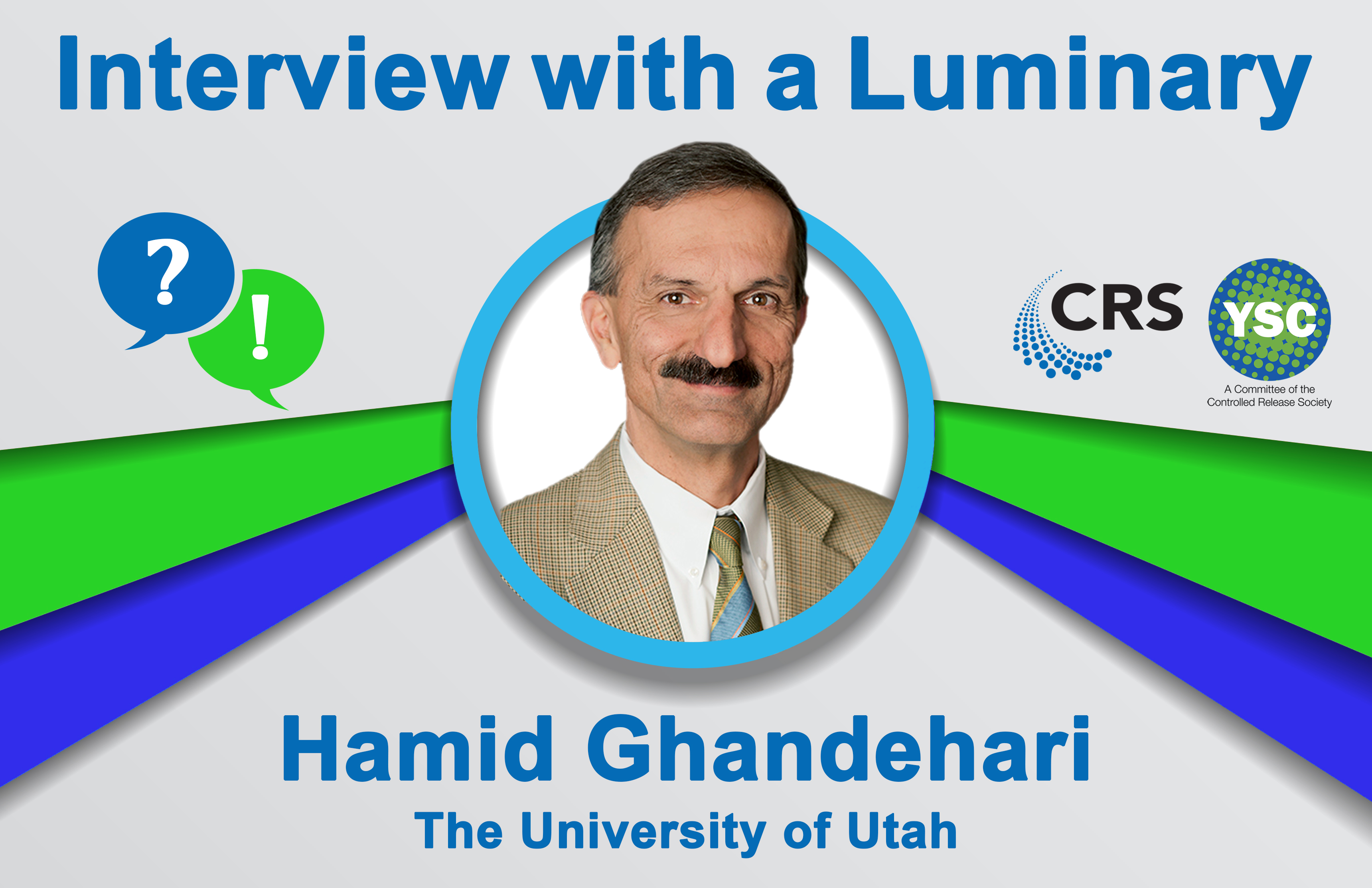
Hamidreza (Hamid) Ghandehari is Professor and George S. and Dolores Doré Eccles Presidential Endowed Chair in the Department of Pharmaceutics and Pharmaceutical Chemistry, Professor of Biomedical Engineering, and Director of Utah Center for Nanomedicine at The University of Utah. His research, reported in over 200 peer-reviewed publications to-date, has focused on the design of recombinant polymers for localized drug and gene delivery, targeted delivery of polymer therapeutics to solid tumours, oral delivery of polymeric conjugates, and assessing the biocompatibility of silica and dendritic nanoconstructs. Dr. Ghandehari is Editor in Chief of Advanced Drug Delivery Reviews, Fellow of the American Institute for Medical and Biological Engineering, the American Association of Pharmaceutical Scientists, and Controlled Release Society, and serves on the boards of several drug delivery journals and organizations. He has been an active member of CRS since 1992. He served as chair of programming committees for the 2012 and 2018 annual CRS meetings. Dr. Ghandehari received his BS in Pharmacy and PhD in Pharmaceutics and Pharmaceutical Chemistry from The University of Utah.
Questions for Luminary
1. What sparked your interest in science in general and drug delivery in particular?
As a high school student, science, and particularly the natural sciences, were among my most favourite subjects. When I was in pharmacy school, I gained some experience in pharmaceutics research and decided that I would like to pursue a PhD degree in this area. This in turn introduced me to Jindřich (Henry) Kopeček, a pioneer in polymeric drug delivery. I did my dissertation in Professor Kopeček’s lab on azobond-containing hydrogels for oral drug delivery. Association with his lab, the world-class graduate program in our department, and attending my first CRS meeting in 1992 (held in Orlando, Florida) were some of the factors that I think sparked my interest in the science of drug delivery.
2. Share a turning point or defining moment you experienced in your work as a scientist.
This is a harder question to answer. I think a turning point in my career as a scientist was in the mid-2000s when some of the initial projects articulated in the lab came to fruition, thanks to the very hard work of my students. We had sufficient publications and substantial funding by then to be able to grow the lab and focus on more fundamental questions to advance drug delivery. By then, we had several grants funded by the NIH and other agencies that enabled us to focus on the understanding of the toxicology of nanomaterials as a function physicochemical properties, systematically correlate the structure of recombinant polymers with their function as localized gene delivery systems and later as liquid embolics, enhance the delivery of polymer therapeutics by more specific targeting strategies and by mild hyperthermia, and better understand the transepithelial transport mechanisms of poly(amido amine) dendrimers in the context of oral drug delivery.
3. Tell us about the exciting ways in which your particular field is progressing.
There has been tremendous progress in drug delivery over the past 3-4 decades. Many of the concepts that were “exotic” at the time, have come to fruition as clinically viable therapeutics. I think this field can make further progress in three fundamental areas: a) a better understanding of the biology of target tissue(s), b) design of novel materials or delivery modalities to improve function, and c) closing the gap for translation. These interdependent areas are very exciting for young scientists to pursue.
4. What is the best piece of professional advice you have received and from whom?
My PhD mentor, and later life-long professional colleague and mentor, used to tell me if you want to excel, first focus on local, then national and then international. He later told me “lead by example”.
5. Would you change anything about your career path if you could start over?
Maybe! I did my graduate studies when I was in my early to mid- 30s and almost immediately after my dissertation defense, I started a new job as an assistant professor. Spending some time as a postdoc to learn new skills in an area somewhat complementary to my graduate education would have enabled me to better articulate hypotheses, define, and execute projects. But as it’s been said hindsight is 2020 and you normally do what you think is the best given your professional and personal circumstances. So, I have no regrets.
6. What advice would you give to someone who is starting their scientific career?
Follow your passion, work hard, balance work with personal life and spend time with loved ones, be a good mentor and always try to consider the growth, advancement and happiness of your team members.
7. What do you enjoy doing outside of the lab? What are your hobbies/interests?
I love hiking and skiing and spending time with my family and three grandchildren!


